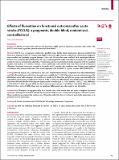Effects of fluoxetine on functional outcomes after acute stroke (FOCUS) : a pragmatic, double-blind, randomised, controlled trial
Date
19/01/2019Metadata
Show full item recordAbstract
Background : Results of small trials indicate that fluoxetine might improve functional outcomes after stroke. The FOCUS trial aimed to provide a precise estimate of these effects. Methods : FOCUS was a pragmatic, multicentre, parallel group, double-blind, randomised, placebo-controlled trial done at 103 hospitals in the UK. Patients were eligible if they were aged 18 years or older, had a clinical stroke diagnosis, were enrolled and randomly assigned between 2 days and 15 days after onset, and had focal neurological deficits. Patients were randomly allocated fluoxetine 20 mg or matching placebo orally once daily for 6 months via a web-based system by use of a minimisation algorithm. The primary outcome was functional status, measured with the modified Rankin Scale (mRS), at 6 months. Patients, carers, health-care staff, and the trial team were masked to treatment allocation. Functional status was assessed at 6 months and 12 months after randomisation. Patients were analysed according to their treatment allocation. This trial is registered with the ISRCTN registry, number ISRCTN83290762. Findings : Between Sept 10, 2012, and March 31, 2017, 3127 patients were recruited. 1564 patients were allocated fluoxetine and 1563 allocated placebo. mRS data at 6 months were available for 1553 (99·3%) patients in each treatment group. The distribution across mRS categories at 6 months was similar in the fluoxetine and placebo groups (common odds ratio adjusted for minimisation variables 0·951 [95% CI 0·839-1·079]; p=0·439). Patients allocated fluoxetine were less likely than those allocated placebo to develop new depression by 6 months (210 [13·43%] patients vs 269 [17·21%]; difference 3·78% [95% CI 1·26-6·30]; p=0·0033), but they had more bone fractures (45 [2·88%] vs 23 [1·47%]; difference 1·41% [95% CI 0·38-2·43]; p=0·0070). There were no significant differences in any other event at 6 or 12 months. Interpretation : Fluoxetine 20 mg given daily for 6 months after acute stroke does not seem to improve functional outcomes. Although the treatment reduced the occurrence of depression, it increased the frequency of bone fractures. These results do not support the routine use of fluoxetine either for the prevention of post-stroke depression or to promote recovery of function.
Citation
FOCUS Trial Collaboration & Sullivan , F 2019 , ' Effects of fluoxetine on functional outcomes after acute stroke (FOCUS) : a pragmatic, double-blind, randomised, controlled trial ' , Lancet , vol. 393 , no. 10168 , pp. 265-274 . https://doi.org/10.1016/S0140-6736(18)32823-X
Publication
Lancet
Status
Peer reviewed
ISSN
0140-6736Type
Journal article
Description
Funding: Funding UK Stroke Association and NIHR Health Technology Assessment Programme.Collections
Items in the St Andrews Research Repository are protected by copyright, with all rights reserved, unless otherwise indicated.

